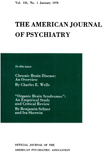PSYCHOTIC MOTHERS AND THEIR CHILDREN: JOINT ADMISSION TO AN ADULT PSYCHIATRIC HOSPITAL
Abstract
During the past year and a half 12 infants and young children have been cared for by their mothers on the adult wards of the Massachusetts Mental Health Center, in conjunction with the hospital treatment of these mothers for severe emotional disorders. This paper reports our experiences in the admission and management of these cases and discusses the implications of this procedure in terms of the responsibilities of the hospital, the therapeutic needs of the patient, and the effects upon the child of being cared for by a disturbed mother.
The following points have been particularly emphasized: 1. By arranging the joint admission, the hospital supports the patient in her role as a mother, whereas the usual practice of separation confirms her belief that she is harmful or destructive to the child. The staff provides information, structure, increasing responsibility, and punitive models for identification–all of which tend to reduce her feelings of guilt and inadequacy. 2. In a protected setting, the patient can safely explore in treatment her hostile feelings as they arise in day-to-day interactions with the child. 3. Positive feelings toward the child are experienced by the mother and reinforced by the staff and other patients.
It is our experience that joint admissions are practical in selected cases, and that they may make a substantial contribution to the mother's recovery. They also present a unique opportunity for the study of difficulties in the mother-child relationship.
Access content
To read the fulltext, please use one of the options below to sign in or purchase access.- Personal login
- Institutional Login
- Sign in via OpenAthens
- Register for access
-
Please login/register if you wish to pair your device and check access availability.
Not a subscriber?
PsychiatryOnline subscription options offer access to the DSM-5 library, books, journals, CME, and patient resources. This all-in-one virtual library provides psychiatrists and mental health professionals with key resources for diagnosis, treatment, research, and professional development.
Need more help? PsychiatryOnline Customer Service may be reached by emailing [email protected] or by calling 800-368-5777 (in the U.S.) or 703-907-7322 (outside the U.S.).



